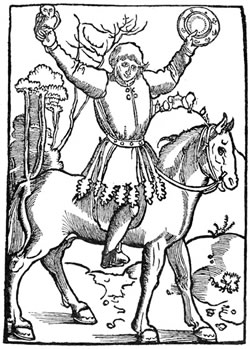
Till Eulenspiegel is said to have been born around 1300 in Kneitlingen, Germany. Whether he was actually born or not is unclear, but he has in any case survived in myth as one of medieval Europe’s most accomplished humorists. The name ‘Till Eulenspiegel’ means ‘Owl Mirror’ in High German, which could have something to do with wisdom and self-reflection. Just as likely (or more likely, given the nature of many of the stories) the name may have a scatalogical meaning derived from Low German ‘ul’n Spegel’, which means ‘wipe the arse’.
Richard Strauss wrote wonderful tone-poems. Till Eulenspiegel’s lustige streiche is as clear a musical-poetic description as could be asked for. It plays a brief and breezy once-upon-a-time beginning; it brings in the character as a theme in the horn, and then plays that theme through his adventures. Till laughs; Till rides a horse through a market; he mocks academics and clergy; he has a seduction moment; and at the end, Till almost rides away, but is ‘brought to justice’. His pleas for life fall on deaf ears, and he is beheaded. Being a fictional character, however, Till can escape maximal damage from execution, and he appears to rise again at the end.
Franz Hasenöhrl’s arrangement for quintet is surprisingly successful, given that it reduces an orchestra of at least 70 people to a mere 5. But the clear and playful content of the tone-poem works in any case, perhaps all the more enhanced for the fact that Hasenöhrl seems to have great fun with it.